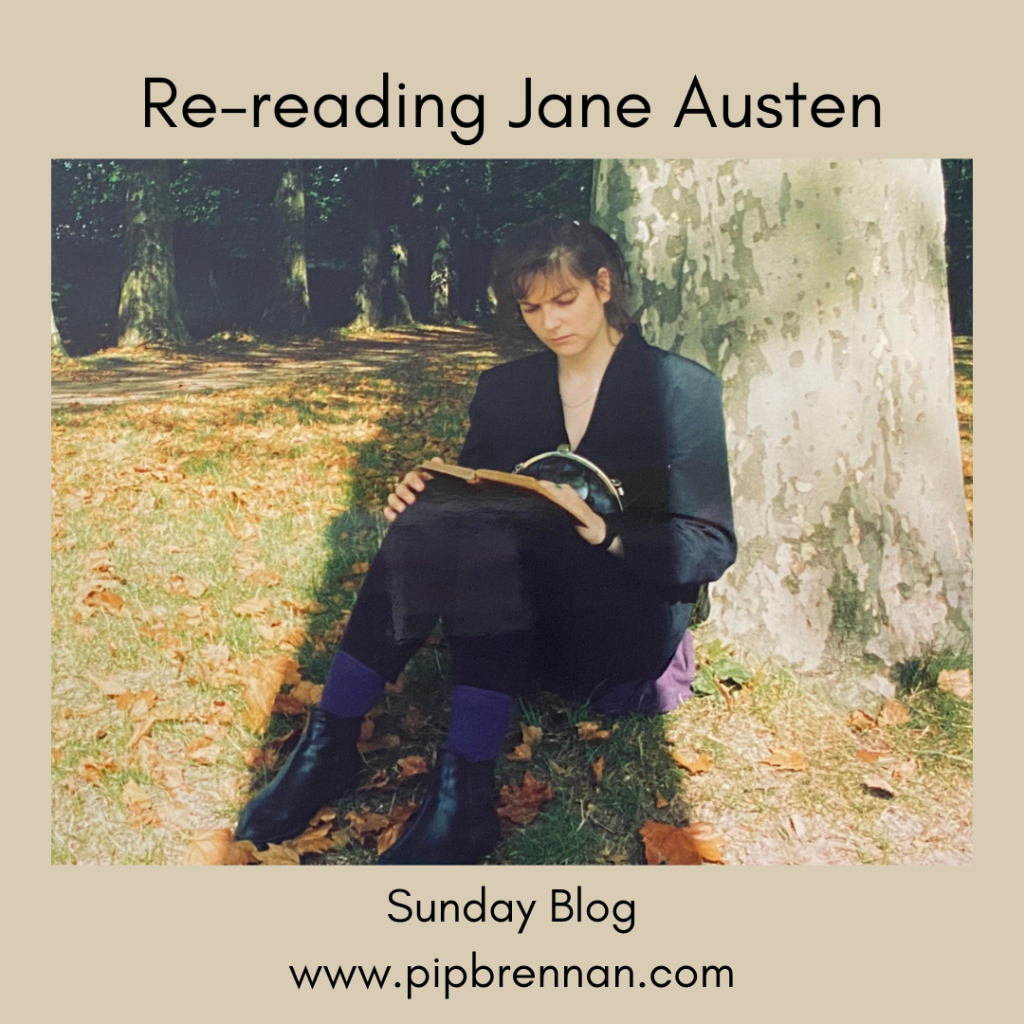Sunday Blog 140 – 16th June 2024

I’m guessing the very first time I read Pride and Prejudice (P&P) I was 16, when the excellent 1981 TV series first aired. I remember the copy we had in our family library. Our shelves were stuffed with classic fiction, poetry, and history. How I loved the small, navy-blue hardback copy of P&P, with its imprint of “Oxford’s World Classics” debossed on the front cover. The rice-paper thin pages and antiquated versions of some words, like shewn instead of shown, for example. How people would dress a sallad and cucumber. I raced through every book Jane Austen ever wrote, and the ones she didn’t quite get to finish.
P&P’s particular perfection soothed me, and over time I considered that navy hardback edition mine and I took it with me when I moved to Europe, aged 25. Perhaps I kept re-reading it to see how I’d changed, while the book’s perfection remained the same.
In the picture I’m 27 years old, re-reading it in the shade of a tree in the garden of Versailles. I was living in London, so that was one decade’s worth of re-reading already. But there was more to come. After a four-week teacher training course, I moved from London to Greece in 1996 to take up a position in a school. I took P&P with me, the only book I saved from my library. I knew I’d need all the comfort perfect prose could provide.
Teaching was every bit as hard as I thought it would be, and the isolation of having to schlep to the phone box to talk to anyone super-charged my isolation. One particularly trying day, I took my sacred copy of P&P with me to the phone box. (Why? Why?) Somehow, in the fug of homesickness and the miasma of unfinished conversations, I left the book at the phone box. Just three blocks later I realised, rushed back breathless – it was gone. I trudged home to my apartment. Sometimes the universe can’t resist giving you a thorough drubbing.
But leaving a well-loved 1950s edition of P&P in a phone box in Thessaloniki in 1997 really was small beer. The giant body blow of surviving a home invasion in 2002 got me thinking about Jane Austen again. I was tussling with how difficult it was to stay in the house afterwards. I wanted to stay but my body was in post-traumatic revolt. In my memoir about the incident (which I’m currently revising), I wrote:
“I thought of Jane Austen’s Anne in Persuasion, who comments ‘one does not love a place less for having suffered there.’ I realised now that only applied to emotional suffering. The kind of visceral, physical ordeal I underwent was precisely what Georgian and Victorian women of the upper classes were assiduously protected from. Perhaps this experience would finally cure me of my habit of re-reading Jane Austen novels. Perhaps that wasn’t altogether a bad thing.”
Apart from being awoken out of my Regency Classics world by reality, another reason I’ve stopped re-reading Jane Austen is that there are just too many new books to read.
Like Zadie Smith’s The Fraud. If you haven’t read it, I would recommend. It’s a complex novel which depicts the enormous suffering of the Caribbean plantation slaves through its complex and even funny plot.
As I listened to a wide-ranging interview with Zadie Smith about the book, discussing her writing and teaching life, my hair nearly stood up on end as she said,
“So if I were teaching, for example, Pride and Prejudice, nothing could be more natural or normal to me to hold multiple ideas simultaneously. I adore that book. I can teach it at a level of rhetoric, a level of character, as a history of the middle classes in England. I know exactly where Darcy’s money comes from: It comes from the Caribbean.”
Interview with Zadie Smith on NPR – https://www.npr.org/2023/09/05/1197604421/zadie-smith-the-fraud
I’m not ruling out ever re-reading P&P again. I now have a green hardback copy on my own shelves, just in case. It jostles with hundreds of more recent books and looks out of place in its antiquity.
When and if I do read P&P, I will always understand the social and economic context of the delightful grounds of Mr Darcy’s home, Pemberley. And that’s not altogether a bad thing. In fact, it’s a vitally important thing.
